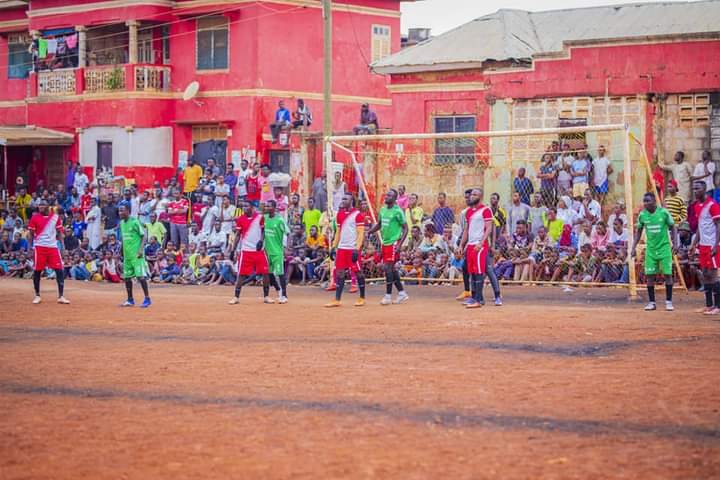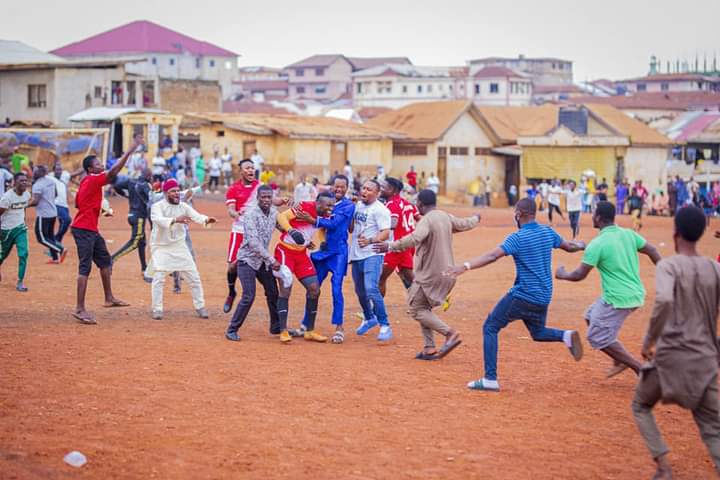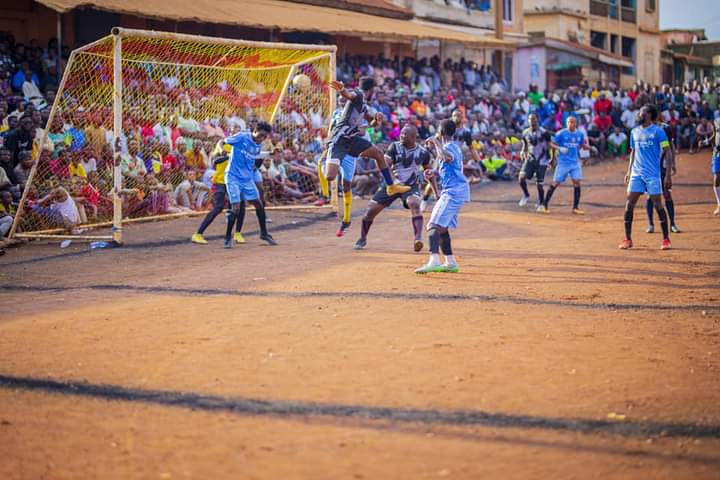The Aboabo Middle B Park, in the heart of the famed town, backs on to houses from the roofs and balconies.
From there, many have a pitch side view, and groceries and barber shops with cleared-out, glassless windows through which customers can watch a glimpse of the action while their ears are lowered. Whenever an expensive match ball enters the stratosphere and goes stray, youngsters scale the walls of these houses, scour the house for its safe retun.
The shabby Middle B Park, has for the past weeks, been hosting the second edition of the Zongo Inter-Tribal -Tribal Football Gala. For starters, these communities are known for their distinct socio-cultural identity and are typically characterised by a concentration of Muslim residents and Islamic institutions such as mosques and Islamic schools.
Zongo communities may also exhibit a unique blend of local culture, traditions, and practices, influenced by the diverse ethnic backgrounds of their residents. These neighbourhoods are often socioeconomically disadvantaged and face challenges related to infrastructure, education, healthcare, and economic opportunities.
In addition to the characteristics mentioned earlier, it is important to note that Zongo communities, due to the socio-economic challenges they face, can also be characterised by the presence of social vices. These challenges, such as high unemployment rates, limited access to quality education, and inadequate infrastructure, contribute to the emergence of social misfits within these communities.
Some of the social vices that can be observed include drug abuse, petty crime, and other negative behaviours. Unfortunately, these challenges and the resulting social issues have contributed to creating a negative perception of Zongo communities in Ghana.
Notwithstanding, Zongos are fruitful places for the creation of culture and obviously, footballers. The Zongos have special significance to the football culture of Ghana, mainly because some of the most prominent footballers from the nation emerged from these areas. The game is a way of life in the Zongos, dominating conversations in barber shops, mosques, from students, taxi and trotro drivers, hawkers, and government workers to the old men.

Mohammed Polo, Anas Seidu, Ibrahim Sunday, Karim Abdul Razak, Malik Jabir, Dogo Moro, Baba Yara, Abedi Ayew, Nii Odartey Lamptey,Ibrahim Tanko, Mallam Yahaya Sulley Ali Muntari all progressed as youngsters in the Zongos, and it is the birthplace of the likes of Mohamed Salisu, Kudus Mohammed,Alidu Seidu, Majeed Ashimeru, Salis Abdul Samed and Kamaldeen Sulemana. Despite the fact that these communties can claim to have seen the formative years of some of the nation’s greats, the attitude is nothing less than understated.”
The Zongo Inter-Tribal Football Gala, held at the modest Aboabo Middle B Park, has become more than just a sporting event. It has emerged as a unifying force, bringing together different tribes within the Zongo community and fostering a sense of camaraderie and shared identity. Football, once again, proves to be a powerful agent of change, offering hope to the youth and helping to address the social vices that have long plagued these communities.
In the past, the Zongo communities faced numerous challenges, including, but not limited to social issues like drug abuse, petty crime, and unemployment. However, the football gala has provided a platform where these challenges can be effectively ameliorated. The tournament serves as an avenue for the youth to channel their energies into something positive and productive, diverting their attention away from negative influences.
Through the shared passion for football, young individuals from diverse tribal backgrounds come together as teammates, transcending any differences or prejudices that might exist. The tournament fosters an atmosphere of inclusivity, where individuals are judged based on their skills and teamwork rather than their tribal affiliations. This unity and mutual respect cultivated on the football field extend beyond the tournament, positively impacting the overall social fabric of the Zongo communities.
The football gala has also served as a catalyst for change within the Zongo communities. Recognising the potential of football as a pathway to success, local authorities and community leaders have started investing in sports infrastructure, creating opportunities for young talent to develop and showcase their skills. This football gala has not only enhanced the talent pool but has also provided an alternative path for the youth – one that encourages them to pursue their dreams and aspirations through sports.

Moreover, the success stories of footballers who emerged from the Zongos serve as powerful inspiration for the younger generation. They see individuals like Mohamed Salisu, Kudus Mohammed, Salis Abdul Samed, Alidu Seidu and Kamaldeen Sulemana, who overcame obstacles and achieved greatness through their dedication to football. These role models instil a sense of possibility and hope, encouraging the youth to believe in their own potential and pursue a better future.
As the inter-tribal football gala gains momentum each year, it has become a symbol of pride and resilience for the Zongo communities. It showcases the rich footballing heritage and the immense talent hidden within these neighbourhoods. Beyond the pitch, the tournament promotes social integration, enhances community cohesion, and dispels the negative stereotypes associated with Zongo communities in Ghana.
The Zongo Inter-Tribal Football Gala stands as a testament to the transformative power of football in uniting diverse tribes, empowering the youth, and addressing the social challenges faced by Zongo communities. This annual event has become a beacon of hope, instilling a sense of belonging, pride, and optimism among the residents.
Through football, these communities are rewriting their narrative and proving that with passion, opportunity, and collective effort, positive change is not only possible but inevitable.
By: Godfred Budu













